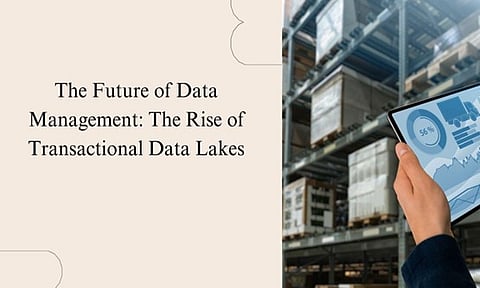

In today’s data-driven world, organizations are generating and processing vast amounts of information at unprecedented rates. Traditional data management systems are struggling to keep up with the demand for real-time insights and high-speed transactions. Raghavendra Gandhi Raketla, a distinguished expert in data analytics, explores the innovations shaping the future of enterprise data management in his latest research.
The history of data storage and computation has been dominated by a substantial transformation from classic data warehouses to flexible and expandable data lakes. Conventional data lakes are not, however, equipped with the transactional consistency required for businesses that demand high data accuracy and real-time computation. Transactional data lakes fill this loophole by merging the expansibility of data lakes with the reliability of structured databases.
Modern business demands data solutions that support simultaneous transactions with Atomicity, Consistency, Isolation, and Durability (ACID). Conventional data architectures suffer from performance loss in processing high-speed data streams. Transactional data lakes have brought revolutionary approaches to processing more than a million transactions per second with unwavering data integrity, thus becoming a game-changer for industries that are driven by real-time analytics. Integrating a robust database system can further enhance the efficiency and reliability of these transactional processes.
Among the leading frameworks enabling this transformation, Delta Lake, Apache Iceberg, and Apache Hudi stand out for their performance and scalability.
Delta Lake fits well into the Apache Spark ecosystem and offers versioning, which guarantees data quality and governance. Apache Iceberg brings new partitioning strategies that greatly improve query optimization and metadata management. Apache Hudi is designed for real-time ingestion of data and incremental processing and thus is best suited for scenarios where data is frequently changing. All these frameworks have a crucial role in enhancing data governance, compliance, and low-latency query response.
Industries handling huge volumes of real-time data have been the first ones to adopt transactional data lakes. Financial services, healthcare, e-commerce, and telecommunications are some of the industries that have all gained from enhanced operational effectiveness and decision-making capabilities.
Financial institutions have improved fraud detection capabilities, lowering 92 percent false positives while processing transactions in milliseconds. Healthcare organizations have enhanced diagnostic accuracy by 45 percent, allowing them to treat patients more quickly with real-time analytics. E-commerce sites have used these technologies to manage inventory more effectively, decreasing stockouts by 82 percent. Telecommunications providers have reduced network downtimes by 76 percent using predictive maintenance approaches.
Even though they have enormous potential, deploying transactional data lakes is not without difficulties. Organizations encounter barriers like legacy system integration, complexities in data migration, and compliance. The necessity of highly skilled data architects and engineers makes large-scale deployments even more difficult. Nevertheless, companies that overcome these challenges see a 40 percent average decrease in data processing expenses and 70 percent quicker query execution times.
The next wave of data lake evolution is the integration of artificial intelligence (AI) and machine learning to automate optimization, anomaly detection, and classification. AI-based data lakes were found to enhance data processing efficiency by 62 percent, far cutting down on the role of manual intervention.
Besides, cloud-native designs are also central to maximizing the use of resources and scalability. Through the utilization of edge computing, organizations have the ability to lower data volumes transferred by up to 85 percent, which allows for real-time analytics at no extra cost in the cloud.
In conclusion, as organizations continue to embrace digital transformation, transactional data lakes are set to become the foundation of enterprise data management. By integrating the best features of traditional warehouses and modern data lakes, they offer an unparalleled solution for handling high-velocity, high-integrity data. With AI enhancements and cloud-native innovations on the horizon, the future of data processing looks more promising than ever. Raghavendra Gandhi Raketla’s insights into these advancements provide a roadmap for businesses aiming to harness the full potential of their data assets.
